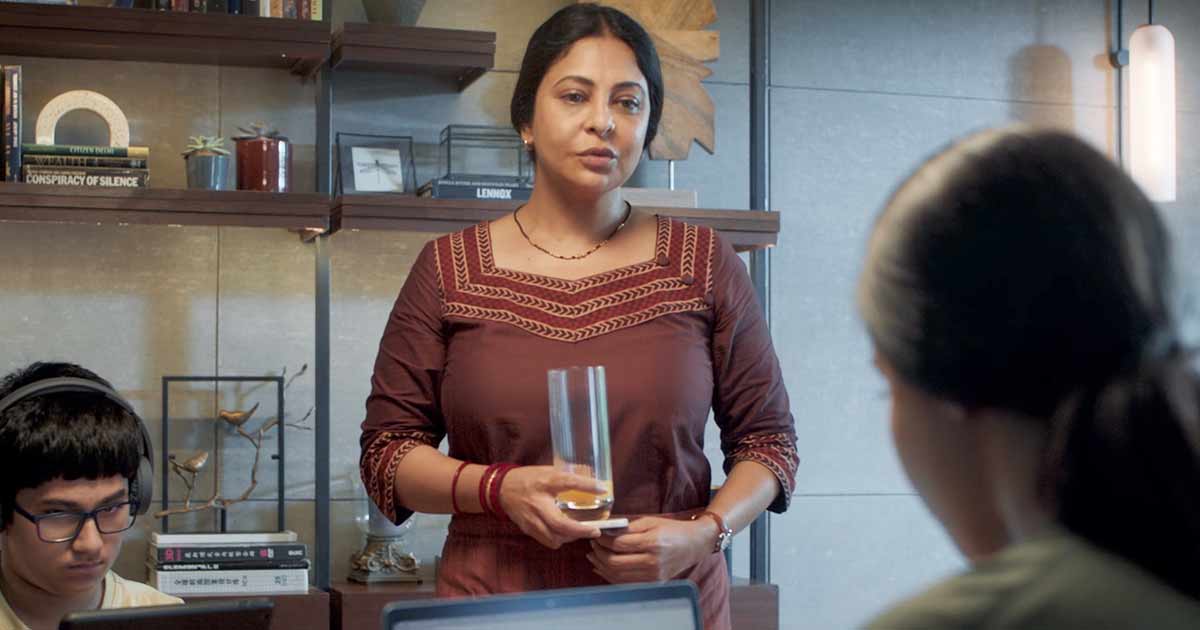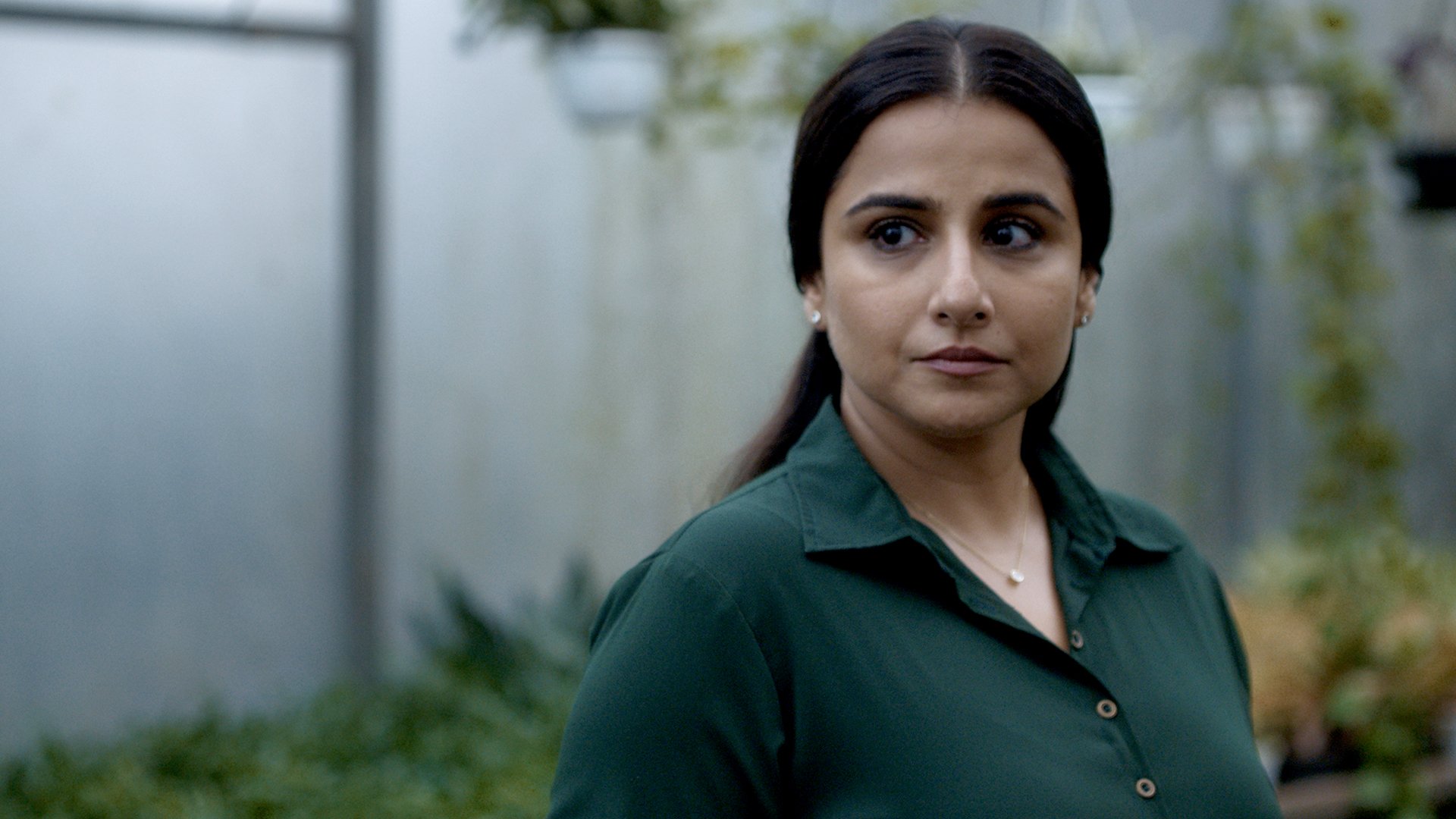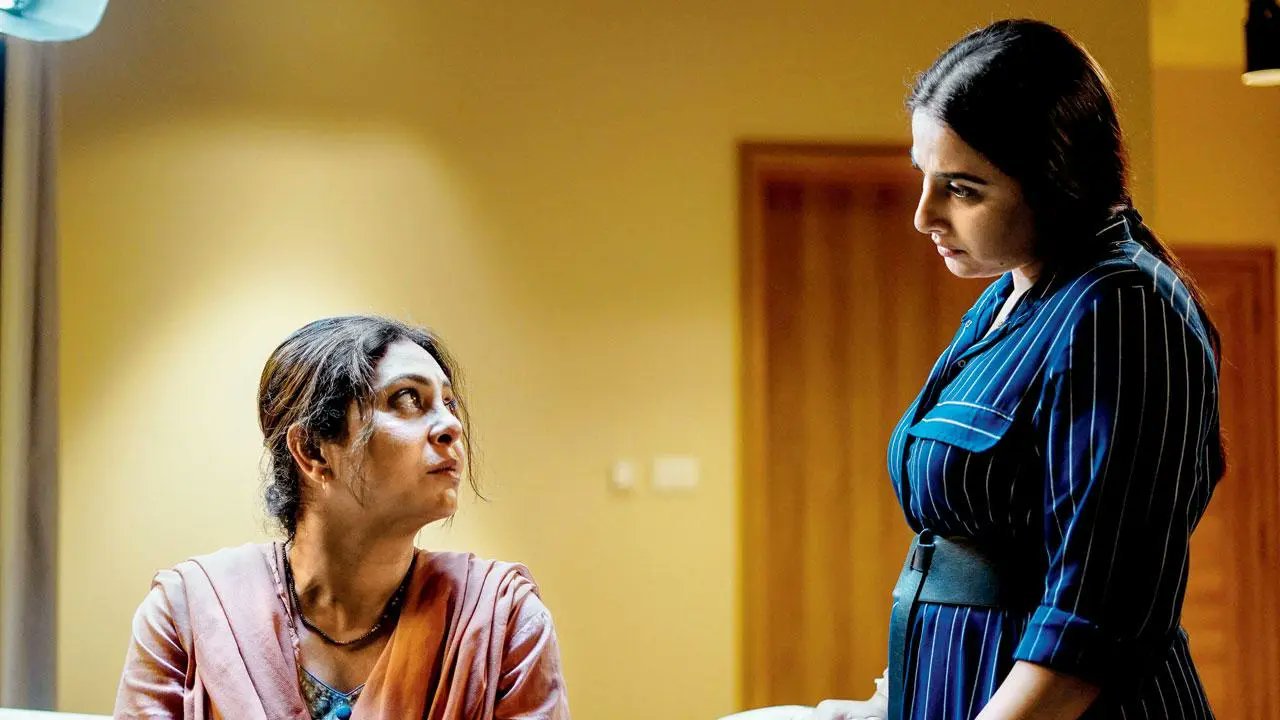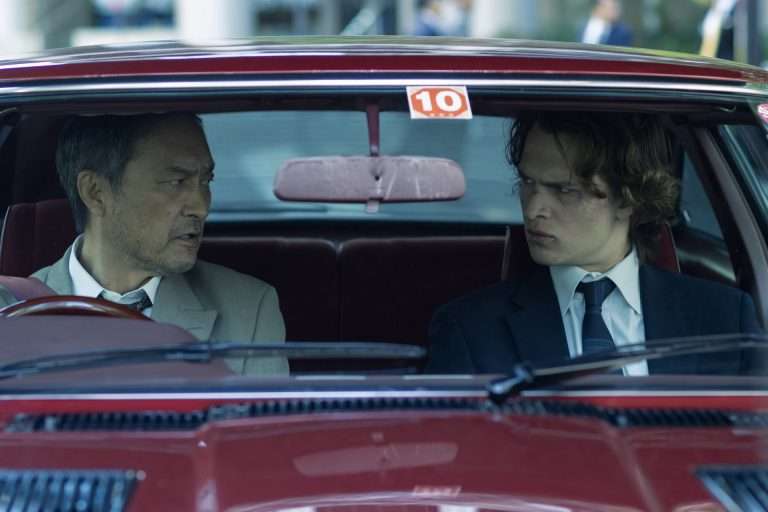Jalsa (2022) Movie Ending Explained & Themes Analyzed: Every once in a while, the noir genre is reinvigorated by filmmakers who truly understand what kind of filmmaking it truly demands. Suresh Triveni’s “Jalsa” is one such film that adroitly meshes themes of class difference onto a noir template, making something that stays wholly true to the Indian context.
The Amazon original movie tells the story of Maya Menon (Vidya Balan) and Ruksana (Shefali Shah), two women whose lives seem quite different at first but later intertwine through an unfortunate incident.
JALSA (2022) MOVIE SYNOPSIS AND SUMMARY:
The film begins with the loud, hustling sounds of the Mumbai local accompanied with the opening credit. “Jalsa” sets up its developing, hermetic atmosphere even before the visuals appear in such a way that once they do appear, the film makes them seem haunted with the coming tragedies which its characters shall endure.
We are introduced to Alia (Kashish Rizwan), Ruksana’s daughter as she is troubled by a young man over a railway bridge. The movie doesn’t linger on Alia’s face, deliberately, almost as if it’s showing her to us through the lens of the society we’re living in, implying how irrelevant and unimportant a girl’s life, coming from a marginalized background, can be. Because why should a girl even be out at ungodly hours?
BREAKING DOWN THE STRUCTURE AND FILMMAKING:
We are led into the film’s inciting incident by a scene that jolts you down, almost in preparation for the kind of experience you would be on during its two-hour runtime. We see Alia being hit by a speeding car, from a third-person point of view. Soon, we learn that Ruksana is her house cook and is the second mother of sorts to Maya’s autistic son, Ayush (a brilliant Surya Kasibhatla).
Ruksana’s younger son Imad (Shafeen Patel) is Ayush’s only friend – a key dynamic that would later play a huge thematic role in the film’s climax. There’s a closeness between families despite the class divide that thankfully never gets shove into your face, but that very closeness comes under scrutiny as the film unfolds.
Jalsa is quintessentially about ethical dilemmas that tend to morally corrupt a person’s life. At around the 22 minute mark, we follow Maya as she leaves her office, seemingly worn out due to the work overload. She clicks a picture of a stray dog, sleeping peacefully near the footpath, as she posts it with a caption reading “I ENVY!!!”
As she starts her car – its engine roaring through the empty roads of Mumbai past midnight – we cut back to the dog, this time waking up jittery from the noise. I was left in awe of how cleverly the second-time feature filmmaker had incorporated a metaphor for class privilege in there, while also hinting at the tragedy that would soon follow. We realize that it was in fact Maya who hit Alia with her car, unaware that she is Ruksana’s daughter.
Related to Jalsa (2022) Movie Explained – Master (2022) Movie Explained: Ending and Themes Analysed
How Does The Film Create Suspense?
The scene of the impact, this time told entirely through Maya’s point of view, consists of some of the finest pieces of editing I’ve seen in an Indian film in a while. Maya doesn’t react right away, she goes numb. We feel that along with her, as her hands shake holding the steering wheel, the sound of the crackling window hinting at the cracks in her life that might forever haunt her while also reinforcing the tension in the scene.
Jalsa (2022) Movie Possible Inspiration And Storytelling Style Explained:
The entry into the second act of the film, following that car accident, made me think of Asghar Farhadi’s 2011 masterpiece “A Separation”- a parallel that I increasingly kept seeing more and more as the film progressed. Having watched the film for the first time on the very weekend it had released, unaware of the kind of reception it had received from the critics, I was quick to assume how well (and quite arrogantly) the movie would turn out through its juxtapositioning of characters thrown into blind coincidences. I was glad that I was proved wrong; “Jalsa” is about moral dilemmas driving people into unwanted scenarios, only for them to later realize that they’re really just miniatures of a much larger system.
When Maya’s mother (Rohini Hattangadi) calls her office after the former confronts regarding the tragic incident to her boss Amar Malhotra (Mohammad Iqbal Khan), we hear the crackling sound of the window again – Maya’s guilt comes crashing to her, even her privilege can’t rescue her soul. Amar counsels that Maya let herself lie low until the storm blows over, but then comes a trainee journalist Rohini (Vidhatri Bandi) who sets out to expose the cover-up.
To be honest, hers was a character which I thought the film handled a bit unconvincingly; it rather felt like a plot device that helped the film tie up its knot into a broader world. But upon re-watch, I was willing to let go of that nitpick, as the film’s overall portrayal of journalists never comes across as gimmicky and they’re never treated as caricatures. I also thought there were a couple of scenes, including one where Rohini finally finds out the truth through CCTV footage, which lacked the necessary punch to juice out more suspense.
This was especially true of a later scene where we learn that Alia would thankfully survive, following which Maya goes to visit her. The more I thought of those aspects, I realized that maybe providing us with those cheap thrills wasn’t the intended purpose of the film in the first place. It all came down to the same kind of conventional tropes we tend to expect from thrillers of such kind.
Jalsa (2022) Movie Themes Explained:
“Jalsa” goes beyond those familiar aspects; it’s a story about transactional familiarity in a sociopolitical space having moral-utilitarian divides, which eventually coalesce into a cathartic resolution. Even when some of the reveals might come across as anticlimactic to some viewers, it doesn’t make them any less emotionally devastating.
As we watch Maya Menon degrade herself into an endless abyss of self-pity and guilt, we witness her facade of being an upright television reporter, always celebrating the success of a high TRP interview show, cripple from within. Yet, the film never makes a case against her and Vidya Balan’s terrific acting makes sure of never crossing that thin line. It’s not until the second half of the movie where we realize that it was in fact Maya herself who was all wriggly while taking that interview with the retired judge.
“Jalsa” is filled with such vivid characterization that doesn’t just make it artistically satisfying, but also a tantalizingly layered film.
EXPOSING THE MORAL DILEMMAS:
As we delve deeper into the fabric of the system, we at first get an impression that the cops are conduits for Maya and her smooth-talking boss’ cover-up. Soon, the film again tempers with our expectations and shows us how further the rot really goes.
The constable advises Ruksana and her husband to take the pay-off amount from the ‘influential people’ (blood money) who have sent them so that they could later take back the complaint. This was another instance where the parallels with “A Separation” became blatantly evident.
WHAT DID THE POLICE CONSTABLE WANT?
We also learn how the constable, a month away from retirement, wasn’t trying to cover up on behalf of Maya’s boss, but rather found himself on a guilt-assuaging journey of his own. He along with his other cop buddy were at the exact spot that very day, in front of the CCTV camera, an hour before the accident took place. Over there, they get into a fight with a couple of men of a local politician trying to put up a hoarding of their boss whose birthday was a few days away.
Ruksana accepts the amount, and the constable decides to drop the case that could’ve potentially landed Maya in the soup, unaware of the larger dynamic in play. Later, Ruksana learns that it was indeed Maya who drove into her innocent daughter that night, and naturally concludes that the sum of money came from her.
As the film went along, gradually unraveling its characters, I was reminded of another underrated film from 2012 – Dibakar Banerjee’s layered adaptation of “Z”- “Shanghai”.
Related to Jalsa (2022) Movie Explained – Windfall (2022) Movie Explained: Ending and Themes Analyzed
Breaking Down The Scene Where Ruksana Confronts The Truth:
After learning of the truth, Ruksana sits on her living room floor, as we see her grieving in an overhead shot. Upon accidentally cutting her finger, blood oozes out of her hand as the film cuts to a shot of her looking at the family portrait hanging on the wall, reminding her what grave injustice she had done with her own daughter.
In the next scene, we see her literally wash the house veranda, as if she’s trying to cleanse herself of the sins, being disgusted by what she had done.
DOES MAYA CONFRONT HER GUILT?
Maya too, on the other hand, finally sees the entire picture – the constable, the politician, the pay-off amount – and realizes how she’s played a part in this entire conundrum. She holds in her hand, the drive folder that contains all the evidence as she decides to turn herself in; even the supposed face of truth and justice had to eventually submit to guilt, burdened by her very soul.
All she’d have to do is destroy it and forget that the whole thing ever happened. As Amar had told her, she was in fact a lucky devil to have gotten away with an almost murder. But maybe, it’s too late. Ruksana, troubled and overwhelmed by feelings of revenge, has taken Ayush along with her to the beach. Maya learns of this through her mother, finally leading us into the most emotionally power-packed ending sequence I’ve watched this year in a film yet.
JALSA (2022) MOVIE ENDING EXPLAINED:
While being stuck in the traffic – a political rally of the politician whose hoarding covered the CCTV, causing all trouble in the first place keeps her from going to the beach. The movie brilliantly cross-cuts between these three scenarios, adding further into both the emotionality and the suspense that it had thus built so far.
In the last scene of the film, Maya reaches the beach, and it is revealed that Ayush is there, playing with Ruksana’s son Imad inside a boat. So is it that Ruksana never left the beach, afraid of what might happen if she did, considering Ayush’s disabled condition? This couldn’t have been the case, since in the last scene she had Imad along with her.
That means Ruksana did leave Ayush on his own on the stranded beach, where the waves were crashing into the shore. We could see a boat at a distance from where Ayush was standing, not so far away from the shore, in a scene that comes before Maya leaves to get him. This would, probably, imply that Ruksana left Ayush in a similar fate she had found her daughter in earlier, during the film’s first half in the area of uncertainty dependent on pure luck. Ayush, accompanied with the boat, might’ve come back to the shore as a result of a possible ebb; there’s also a change in color palette suggested as the last scene in the film seems relatively darkly lit.
Was it Ruksana’s inner guilt that brought her back to the beach? Or was it Imad, who convinced her into going back? “Jalsa” remains equivocal of its ending, preserving the artistic essence of everything that came before. It can be looked at as a film about class divide, a domestic thriller, or even a film about the privileged authoritarian class pushing against the marginalized.
Maya throughout the movie keeps an eye on Ayush through her phone and web cameras to make sure he’s doing okay while he stays at his own house. Ruksana on the other hand, can’t afford to, which makes Alia get into an unfortunate incident. In the end, a political party makes a literal celebration (the film’s title) out of its win, while the deeply seeded socioeconomic divide cracks down upon the families.
ROOTING FOR THE MORALLY COMPLEX CHARACTERS:
The film is a textbook lesson on how to do subtle sociopolitical storytelling, as it creates stark contrasts while also drawing deep comparisons between its two lead characters. It’s a morally complex film that does not become morally confusing, even when it leaves you to struggle with its moral compass.





![Poor Agnes [2017]: Fantasia Film Festival Review](https://79468c92.delivery.rocketcdn.me/wp-content/uploads/2017/07/PoorAgnes_2-768x433.jpg)
![An Elephant Sitting Still [2018]: ‘TIFF’ Review – A Gritty Romanticism with Fatalism](https://79468c92.delivery.rocketcdn.me/wp-content/uploads/2018/09/elephantsittingstill_07-768x384.jpg)


